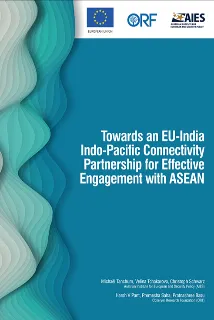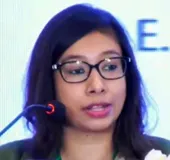‘Global Gateway’ and the Logic of an EU-India Partnership to Engage ASEAN
The Indo-Pacific region generates 60 percent of global gross domestic product (GDP) and is economically linked to Europe through transregional production networks and supply chains. Located at the geographic heart of the Indo-Pacific’s maritime trade routes, the 10 member states of the Association of Southeast Asian Nations (ASEAN) form the hub of the Indo-Pacific’s commercial connectivity architecture. With a combined 2019 GDP of USD3.2 trillion, ASEAN was the world’s fifth largest economy that year and is on track to become the fourth largest by 2030.[i] In recent years, this centrally important region is increasingly coming under China’s hegemony. Having emerged as ASEAN’s dominant economic partner, Beijing is leveraging the structural asymmetry in the China-ASEAN relationship to become the principal agenda-setter at the core of the Indo-Pacific’s connectivity architecture.[ii] This development has become a cause for alarm not only in Southeast Asia, but in other countries as well, including India and in Europe.
For the European Union (EU), China is both a crucial trading partner, and an economic competitor and systemic rival. Aiming to align with third countries for mutual benefit to offset China’s influence, the EU, on 15 September 2021, launched its Global Gateway initiative—[iii] a grand strategy for connectivity designed to counter China’s Belt and Road Initiative (BRI). Dedicating €300 billion for Global Gateway investments between 2021 and 2027,[iv] the EU is placing unprecedented financial and programming resources toward commercial connectivity development in various regions around the globe.
Seen in the Global Gateway context, an EU-India Strategic Partnership holds great potential to ensure the fulfilment of Europe and India’s shared vision of a free and open Indo-Pacific. India’s economy is slated to be the world’s third largest by 2030 and its population is projected to become the world’s largest by 2027. With two coastlines located in the centre of the Indian Ocean, India can become a critically important partner for the EU as the Union seeks to balance its relations with China while securing the expansion of its engagement with ASEAN member states.
ASEAN’s centrality is common to the EU’s and India’s respective Indo-Pacific commercial connectivity agendas. In 2020, ASEAN was the EU’s 5th largest trading partner with a total bilateral volume of €189 billion.[v] Similarly, ASEAN was India’s 4th largest trade partner with approximately €54 billion in total bilateral trade in 2020.[vi]
In July 2020, the 15th India-European Union Summit adopted a framework document, “India-EU Strategic Partnership: A Roadmap to 2025”, to guide joint action and strengthen cooperation. Reflecting the EU and India’s shared view of ASEAN centrality, the roadmap specifically called on India and the EU to “enhance exchanges in the context of Asia-Europe Meeting (ASEM) and the Association of Southeast Asian Nations (ASEAN) Regional Forum on common priorities between India and the EU.”[vii]
This policy report seeks to contribute to this task. It makes an assessment of how areas of convergence between the EU and India can bolster effective engagement with ASEAN and enhance the EU-India relationship itself. Cooperation in a third region offers possibilities for EU-India commercial engagement that have so far eluded the EU-India bilateral relationship. While the EU is India’s 3rd largest trade partner,[viii] India is only the EU’s 10th.[ix] Europe has a far denser commercial presence in ASEAN markets than India. Amidst these and other challenges, this analysis has identified key partnership opportunities that will be mutually beneficial for EU and India in working to expand the scope of engagement with ASEAN member states.
This assessment seeks to be in consonance with the Global Gateway’s priorities and the sustainable development focus of its sister program, the European Green Deal—the EU’s USD1-trillion initiative for ameliorating climate change at home and abroad. Therefore, it focuses on four policy areas to enhance EU-India collaboration in fostering connectivity with ASEAN: Supply chain resilience; Green energy transition; Digitalisation; and Maritime security cooperation and capacity building. For the three commercial areas, the study has found a common approach requiring four fundamental actions for effective EU-India engagement in ASEAN. After laying out a detailed analysis of these areas, the study will proceed with an evaluation of effective approaches for EU-India maritime security cooperation and engagement with ASEAN. The study concludes with specific policy recommendations.
Read the entire report here.
About the Authors
Pratnashree Basu is an Associate Fellow with ORF’s Strategic Studies Programme. She works on maritime geopolitics in the Indo-Pacific, with a focus on the South China Sea. Her work explores the political and functional dimensions of a rules-based maritime order and maritime law and governance. She is a 2017 US Department of State IVLP Fellow and is currently pursuing her Ph.D. in International Relations at Jadavpur University.
Prof. Harsh V Pant is Director of Studies and Head of the Strategic Studies Programme at ORF. He is Professor of International Relations at King’s College London and Director (Honorary) at Delhi School of Transnational Affairs, Delhi University. His research is focused on Asian security issues.
Dr. Premesha Saha is an Associate Fellow with ORF’s Strategic Studies Programme. Her research focuses on Southeast Asia, East Asia, and the South Pacific, and emerging dynamics in the Indo-Pacific region. Her other research interests include: Indonesia’s maritime strategy, India’s relations with Southeast Asia, India’s ‘Act East’ Policy, and multilateralism in the Asia-Pacific. She obtained her Ph.D. from the Centre of Indo-Pacific Studies, School of International Studies, Jawaharlal Nehru University.
Christoph Schwarz is a Research Fellow at the Austrian Institute for European and Security Policy (AIES). His research focuses primarily on the EU’s role in the international system, especially with regards to the unfolding power dynamics of the Indo-Pacific region. Christoph holds an MSSc. in International and European Relations from Linköping University, Sweden.
Prof. Michaël Tanchum is senior associate fellow at the Austrian Institute for European and Security Policy (AIES) and an associate senior policy fellow at the European Council on Foreign Relations (ECFR). He teaches international relations and political economy at Universidad de Navarra, Spain. Prof. Tanchum holds a Ph.D. from Harvard University and was a Fellow at Harvard’s Olin Institute for Strategic Studies and its Weatherhead Center for International Affairs.
Velina Tchakarova is Director of the Austrian Institute for European and Security Policy (AIES) and Peer Board Member of the Defence Horizon Journal. She is a lecturer at the Real World Risk Institute led by the best-selling author Nassim Taleb and a Member of the Strategic and Security Policy Advisory Board of the Science Commission at the Austrian Federal Ministry of Defence. Velina holds an M.A. from Heidelberg University, Germany, and a BA from the University for World and National Economy, Bulgaria.
Acknowledgements
The authors from the AIES team express their heartfelt thanks to Markus Keuper for his research assistance. The ORF team would like to thank Bhavesh Kr. Sindhura and Rahul Kamath for their research assistance.
This project is part of the EU-India Think Tanks Twinning Initiative 2020-22. Launched in 2015, the project promotes interaction between leading Indian and European think tanks through a series of joint projects involving research publications and events. The aim is to stimulate debate and discussion on important global, regional and bilateral issues, foster research and academic discourse, and provide policy analysis and informed guidance to leadership on both sides, thus contributing to enriching the EU-India strategic partnership. For more, see: https://euindiathinktanks.com/
About the Austrian Institute for European and Security Policy (AIES): For over 25 years, the AIES has been conducting research on various issues regarding the European integration process as well as the European Union in the context of geopolitical and geoeconomic developments in the international system. The focus themes are the EU’s Common Foreign and Security Policy (CFSP), the Common Security and Defence Policy (CSDP), and Europe’s relations with the world.
[i] Joo-Ok Lee and Shaun Adam, “ASEAN is poised for post-pandemic inclusive growth and prosperity – here’s why”, The Davos Agenda, January 18, 2022,
[ii] Farah Nadine Seth and Sharon Seah, “The ASEAN-China Partnership: Balancing Merits and Demerits”, Perspective, ISEAS, Yusof Ishak Institute, September 10, 2021,
[iii] Ursula von der Leyen, “State of the Union 2021 – Strengthening the Soul of our Union“, European Commission, September 15, 2021.
[iv] “Global Gateway: up to €300 billion for the European Union’s strategy to boost sustainable links around the world“, European Commission, December 1, 2021.
[v] ASEAN-EU Trade in Goods Statistics, Eurostat, April 2021.
[vi]“Goyal pushes for a reset of India-ASEAN FTA”, The Hindu, October 8, 2021.
[vii] “India-EU Strategic Partnership: A Roadmap to 2025”, Media Centre, Ministry of External Affairs, Government of India, July 15, 2020.
[viii] “Countries and Regions – India”, European Commission.
[ix] “European Union, Trade in goods with USA”, Directorate General for Trade, European Commission, February 2021.

 PDF Download
PDF Download



 PREV
PREV







